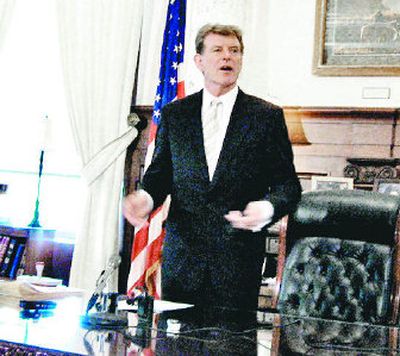Idaho Legislature: Deal on grocery-tax credit unlikely

BOISE – The legislative session is lurching toward adjournment – possibly with no deal on grocery tax relief.
That was a top priority both Gov. Butch Otter and lawmakers wanted to address this year, since the Legislature raised the sales tax from 5 percent to 6 percent in August.
This morning, the House will try to override Otter’s veto of the grocery tax relief bill that earlier passed both houses overwhelmingly. Meanwhile, deals are in the works on highway bonding and emergency communications upgrades, and the session is expected to end Thursday.
“We’ll attempt an override,” said House Speaker Lawerence Denney, R-Midvale. “I think it will be close.” There may also be an attempt to override Otter’s veto of the bill to ban smoking in Idaho bowling alleys, which earlier passed both houses with vetoproof majorities.
The legislative session, scheduled to end last Friday, has turned into a surprising tussle between lawmakers and the new governor, considering that both he and three-quarters of lawmakers are Republicans.
Otter’s been holding out for his own, means-tested grocery tax credit aimed only at the low-income, but most legislators in both houses have been unwilling to back that. The plan they approved would double the current annual grocery tax credit from $20 per person to $40 for everyone, and raise it from $35 to $60 for seniors. Now, it’s looking like they will either override the veto or end their session with no grocery tax relief at all.
Rep. Frank Henderson, R-Post Falls, said, “I know those of us from the north made a solid commitment to do everything we can to find some relief on grocery taxes.”
Rep. Bob Nonini, R-Coeur d’Alene, said he’d back a veto override. “I believe I owe it to my constituents to try to do what we told ‘em we’d do.”
Idaho is one of a minority of states that fully applies its sales tax to groceries. Pressure to change that has mounted since the August special session, which raised the sales tax to offset property tax cuts.
Otter on Tuesday, for the first time, sounded ready to let the issue go for this year. “My bill wasn’t going to take effect until 2008,” he said. “What I’m saying is that we could get busy in early January next year, use this next 10 months to kind of get the wrinkles worked out of our tax relief package … and be ready to hit it hard next January.”
If legislators want to try to override his veto, he said, “that’s their prerogative.”
House Democrats said their 19-member caucus is divided on the veto override. “There’s no official caucus position,” said Assistant Minority Leader George Sayler, D-Coeur d’Alene. “Most would probably vote not to override, but we’ve always had some difference of opinion.”
It takes a two-thirds vote to override a veto – that’s 47 votes in the 70-member House, and 24 in the 35-member Senate.
When the final version of the grocery tax relief bill, House Bill 81a, won passage in the House on March 19, there were just six “no” votes. The measure passed the Senate unanimously on March 15.
On Tuesday, Otter issued his fifth veto of the session, this time targeting an obscure measure, HB 105, that would have revised a formula to allow retiring state employees to transfer slightly more unused sick leave into their retirement accounts to cover insurance premiums. The bill was backed by the state employees’ association.
Otter wrote in his veto message, “Since state employee benefits approximate those of the average competitor while state employee pay is 15.6 percent behind the market, our focus should be on increasing state salaries and narrowing the gap rather than incrementally increasing benefits and widening the gap.” The bill had passed the Senate unanimously and the House 60-9.
Lawmakers extended their session into this week when the grocery tax issue remained unresolved, the House and Senate battled over a proposed $246 million highway bonding plan, and legislative budget writers snubbed the governor’s request for a multimillion-dollar emergency communications upgrade. Both the highway plan and the communications upgrade are back on the agenda for the Legislature’s joint budget committee this morning, and Otter said he thought both issues had been “worked out to everybody’s satisfaction.”
His vetoes, however, remained controversial among lawmakers, and the governor hinted there could be more.
At a bill-signing ceremony Tuesday, Otter played with his big, red “VETO” stamp before he started the ceremony, swinging it around and then leaving it atop a stack of bills on his desk.
Otter held the public bill-signing – his first – to sign the state Board of Education budget bill, which includes his proposal for a $5 million incentive to help fund a newly formed community college district. He treated the event as a campaign kickoff for a new community college in the Boise-Nampa area. Otter said he has personally pledged $2,000 to the campaign, which needs two-thirds approval at the May 22 election to succeed.